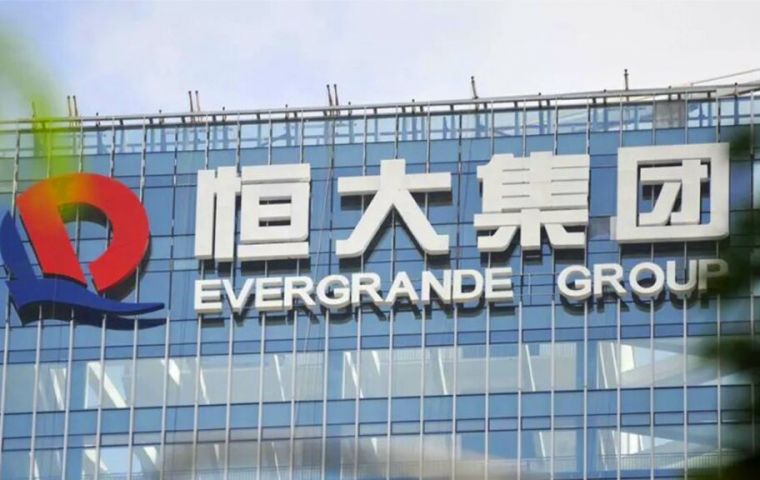MercoPress. South Atlantic News Agency
Chinese giant Evergrande's debt spreads fears among world markets
 A global financial crisis is on the brink of either taking place or being averted
A global financial crisis is on the brink of either taking place or being averted As the Chinese Evergrande Group falls into debt some regards as an encore of the Lehman Brothers crisis of 2008, markets around the globe have begun to brace for the worst despite little signs of encouragement in the opposing sense.
Nevertheless, Asian markets have stabilized early Tuesday although Evergrande's crisis continued to keep investors nervous amid fears over its possible collapse, while a tightening of its monetary policy by the US Federal Reserve, coupled with a rising number of COVID-19 infections keep slowing down a much-awaited global recovery.
In addition to that, there were concerns Monday that the United States might miss on its upcoming debt payments, which would spell disaster among financial markets, where uncertainty reign supreme.
With Evergrande wallowing in debts of more than US $ 300 billion and interests due by this coming Thursday, most experts expect the firm to default on the payments, though it does have a 30-day grace period afterwards.
National holidays in China Monday and Tuesday have added to the confusion stemming from Beijing's strict new rules which prevent the company from finishing its developments and make cash from sales.
Aside from Evergrande, focus this week is on the Fed's latest policy meeting, with observers predicting it will set out its timetable for tapering the vast bond-buying monetary easing program that has been a key driver of a global recovery for more than a year.
All three main indexes on Wall Street ended well in the red Monday. There is a growing concern that US lawmakers will not reach an agreement to raise the country's debt ceiling to keep the government running and pay its bills, with Republicans against the move.
Treasury Secretary Janet Yellen warned in an article for The Wall Street Journal that a default would “likely precipitate a historic financial crisis that would compound the damage of the continuing public health emergency”.
In this scenario, Argentine stocks listed on the Buenos Aires and New York Stock Exchanges started the week with a strong decline, of up to 9%, impacted by both local and external factors. Just a week ago, the Buenos Aires Stock Exchange had reached a record of 83,923 points, but the political crisis that broke out in the Government had an impact on investors' spirits and caused local stock market activity to begin to decline.
However, so far in 2021, the leading panel of the local Stock Exchange maintains a gain of 46.6% in pesos and 11% in dollars. For its part, the Country Risk index for Argentina, measured by the JP Morgan bank, rose 23 units this Monday, to 1,535 basis points.
Evergrande's shares plummeted 10.63% Monday on the Hong Kong Stock Exchange, hitting their nadir in more than 11 years, out of bankruptcy fears.
Evergrande was founded in the 1990s and grew exponentially during the Chinese property boom, but its situation was exacerbated by restrictions imposed by China.
Evergrande is the second-largest real estate developer in China and the world: it employs some 200,000 people directly and generates more than a million jobs through subcontractors.




Top Comments
Disclaimer & comment rulesCommenting for this story is now closed.
If you have a Facebook account, become a fan and comment on our Facebook Page!